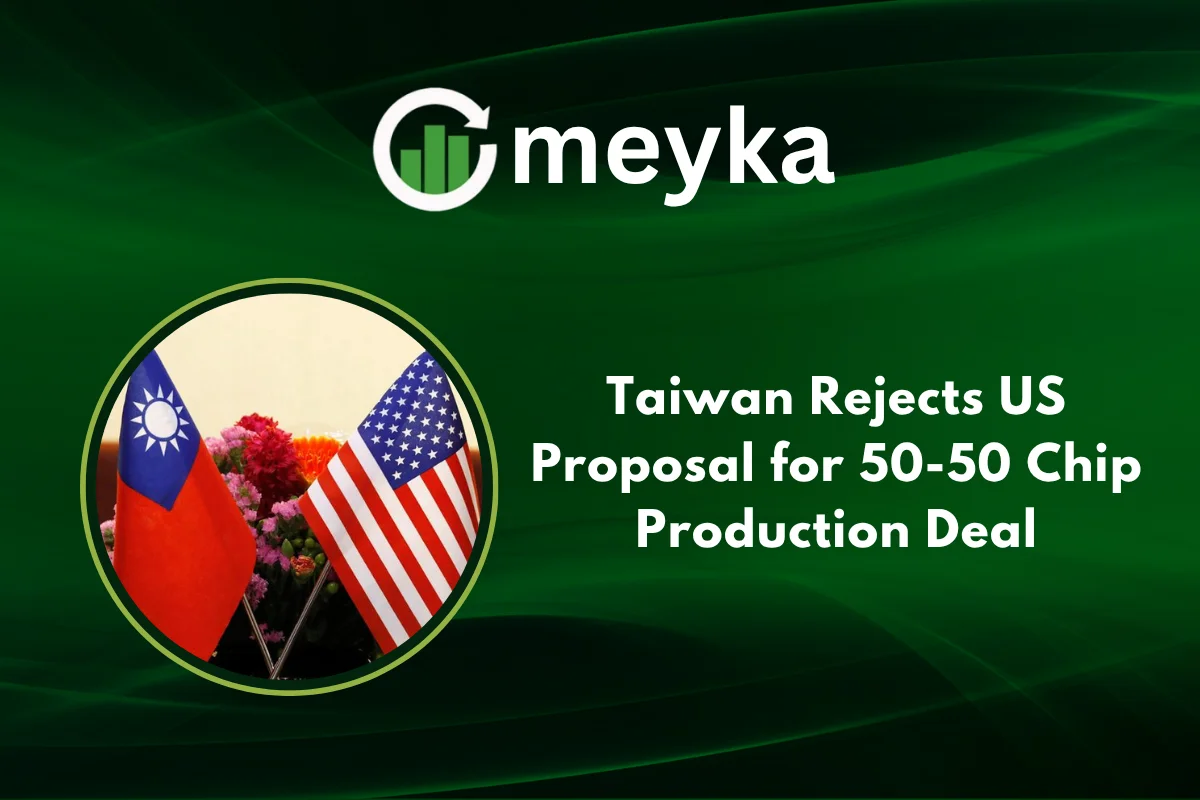Taiwan Rejects US Proposal for 50-50 Chip Production Deal
The global technology race is heating up, and chip production is at the center of it. Recently, Taiwan firmly rejected a United States proposal for a 50-50 chip production deal, creating ripples across the stock market and the global semiconductor industry. This decision not only impacts the AI stocks boom but also raises questions about the future of supply chain security and geopolitical alliances.
Taiwan’s Central Role in Global Chip Production
Taiwan is often called the silicon shield of the world. With Taiwan Semiconductor Manufacturing Company (TSMC) leading the industry, the island produces over 60% of the world’s semiconductors and more than 90% of advanced chips. These chips power smartphones, laptops, cars, data centers, and the rapidly growing field of artificial intelligence.
The United States, worried about its dependence on foreign production, has been pushing for domestic manufacturing partnerships. However, Taiwan’s rejection of a shared production model highlights the delicate balance between sovereignty, security, and economic strategy.
The US Proposal: A 50-50 Chip Production Partnership
According to reports, Washington had suggested a 50-50 chip production agreement, where Taiwanese companies like TSMC would split manufacturing responsibilities equally with US-based firms. The goal was to strengthen America’s chip independence and reduce reliance on Asian supply chains, especially amid growing tensions with China.
But Taiwan viewed this deal as an attempt to weaken its dominance in the semiconductor sector. By splitting production, Taiwan risked losing its edge and strategic leverage in global politics.
Why Taiwan Rejected the Deal
Several key factors drove Taiwan’s decision:
National Security Concerns
Taiwan’s chip industry acts as a strategic shield. By maintaining its technological edge, Taiwan ensures that global powers, especially the US, have vested interests in protecting its sovereignty. Sharing production equally could dilute that leverage.
Economic Control
TSMC and other Taiwanese companies currently set the tone for the global semiconductor market. A 50-50 deal would shift pricing power and technological leadership toward the US, something Taiwan wants to avoid.
Technology Protection
Taiwan is at the forefront of cutting-edge chip design, including 3nm and 2nm processes. Sharing such sensitive technology could risk intellectual property leakage, potentially reducing Taiwan’s long-term advantage.
Domestic Politics
Local leaders and the Taiwanese public are wary of giving up too much control over a sector that is vital for their economy and international influence. The government prefers cooperation, but not at the cost of sovereignty.
Impact on the Global Stock Market
The rejection of the deal has already influenced stock research trends, with investors closely monitoring companies linked to semiconductor supply chains.
- AI stocks remain volatile, as chip shortages directly impact companies in artificial intelligence, cloud computing, and autonomous vehicles.
- US semiconductor firms like Intel and Nvidia are under pressure to secure reliable chip supplies without depending too heavily on TSMC.
- TSMC shares saw short-term fluctuations as markets digested the news, but analysts believe Taiwan’s stronghold on production will keep it profitable in the long run.
This development also strengthens the argument for diversification. Countries like Japan, South Korea, and members of the European Union are pushing investments in their domestic chip industries to reduce dependency on Taiwan and the US.
US Strategy: Building Domestic Chip Power
The United States is investing heavily in domestic semiconductor manufacturing through initiatives like the CHIPS and Science Act. Major funding has been allocated to build new plants across Arizona, Texas, and New York. Companies like Intel, Micron, and GlobalFoundries are beneficiaries of these incentives.
However, building advanced chip facilities is a long-term game. Experts say it could take years before the US can match Taiwan’s efficiency and expertise. In the meantime, Taiwan’s refusal to share control keeps Washington searching for alternative strategies.
China’s Watchful Eye
This issue also has a geopolitical layer. China claims Taiwan as part of its territory and has been increasing military pressure in the region. By holding firm against the US proposal, Taiwan is sending a signal that it intends to remain the undisputed leader of chip production.
China, meanwhile, has been trying to accelerate its own semiconductor industry, but it remains behind Taiwan in terms of advanced chip-making technology. This makes Taiwan’s decision even more important for the global balance of power.
What This Means for Investors
For investors, Taiwan’s move highlights both risk and opportunity in the chip production sector.
- AI-driven companies: Firms relying on cutting-edge chips may face supply chain bottlenecks, leading to potential short-term volatility in AI stocks.
- Long-term chip investments: Taiwan’s leadership in chip production remains strong, suggesting that companies tied to its ecosystem could continue to grow.
- Diversification strategies: Investors should also monitor US and European efforts, as new facilities could eventually reduce global reliance on Taiwan.
Smart stock research will be crucial for those seeking to capitalize on these shifts while mitigating risk.
The Road Ahead: Cooperation or Competition?
Taiwan’s rejection of the 50-50 deal does not mean it will stop working with the US. In fact, TSMC is already building facilities in Arizona. However, these plants will only handle a portion of production, with the most advanced technology staying in Taiwan.
This careful balancing act ensures that Taiwan remains indispensable while maintaining cooperation with its global allies. Moving forward, the world may see more selective partnerships, where Taiwan shares capacity but not full control.
Conclusion
The rejection of the US’s proposed 50-50 chip production deal underscores Taiwan’s determination to remain the global hub of semiconductors. For Washington, the path to chip independence will be slower and more expensive than anticipated. For investors, the chip industry remains a critical space that will shape the future of technology, AI stocks, and the global stock market.
FAQs
Taiwan rejected the deal to protect its national security, maintain control over its semiconductor industry, and safeguard its technological edge in chip production.
AI companies rely heavily on advanced chips. Any disruption or limitation in supply can cause volatility in AI stocks, making this a critical issue for tech investors.
The US is pushing forward with its CHIPS Act investments, building domestic plants with companies like Intel and Micron, while also exploring partnerships with Japan, South Korea, and Europe.
Disclaimer:
This content is made for learning only. It is not meant to give financial advice. Always check the facts yourself. Financial decisions need detailed research.






